 This touching short story from Daniel Keyes is about a mentally handicapped man who undergoes experimental surgery to enhance his intelligence. The operation’s initial success highlights an interesting aspect of intelligence: the very gifted can be as out of touch with reality and friendless as the intellectually challenged. The story raises an important issue: How far should medical science go in tampering with nature or, as some would say, the will of God? Perhaps the answer lies in Charlie’s ultimate fate, ironically going backwards in intelligence rather than forwards. Other themes include innocence, friendship, compassion, bullying and sacrifice. More…
This touching short story from Daniel Keyes is about a mentally handicapped man who undergoes experimental surgery to enhance his intelligence. The operation’s initial success highlights an interesting aspect of intelligence: the very gifted can be as out of touch with reality and friendless as the intellectually challenged. The story raises an important issue: How far should medical science go in tampering with nature or, as some would say, the will of God? Perhaps the answer lies in Charlie’s ultimate fate, ironically going backwards in intelligence rather than forwards. Other themes include innocence, friendship, compassion, bullying and sacrifice. More…
Category Archives: Novelettes
The Smoothest Way Is Full of Stones
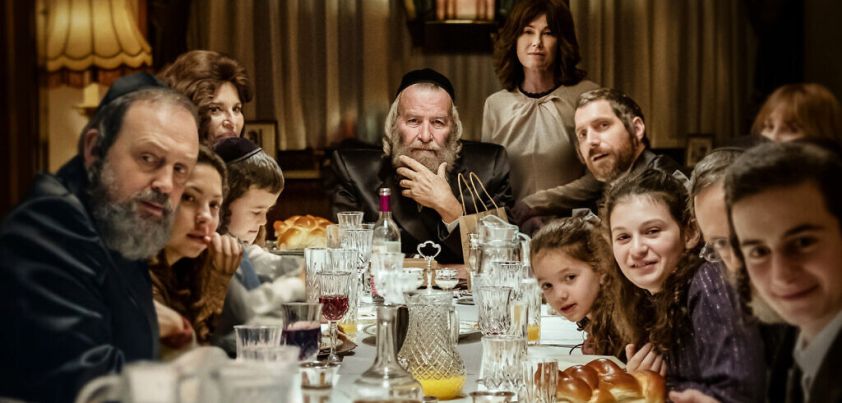 This story by Julie Orringer explores aspects of life and growing up in an American Orthodox Jewish community. Due to her mother’s illness, a teenage Jewish girl raised in a secular environment spends her school holidays living in the Orthodox community of an aunt. Despite community concern that she may be a bad influence on her cousins, she adjusts well to the Orthodox way of life. It is her rebellious, similar-aged cousin, beginning to explore her sexuality, who breaks the community’s strict behavioral rules. Themes include family, protectiveness and distrust, secular vs. Orthodox lifestyles, spiritual awakening, and emerging sexuality. More…
This story by Julie Orringer explores aspects of life and growing up in an American Orthodox Jewish community. Due to her mother’s illness, a teenage Jewish girl raised in a secular environment spends her school holidays living in the Orthodox community of an aunt. Despite community concern that she may be a bad influence on her cousins, she adjusts well to the Orthodox way of life. It is her rebellious, similar-aged cousin, beginning to explore her sexuality, who breaks the community’s strict behavioral rules. Themes include family, protectiveness and distrust, secular vs. Orthodox lifestyles, spiritual awakening, and emerging sexuality. More…
The Hospice
 Author Robert Aickman preferred to be called a writer of “strange fiction” rather than ghost or horror stories. The Hospice, considered one of his best, is a good example of why. The story is full of unexplained twists and turns. It builds to what readers expect will be a typical horror climax, then seemingly falls flat with the protagonist safely on his way home. But is he? It’s easy to see why Aickman has been called the English Kafka. Was it a dream? Delirium caused by an animal bite? Supernatural forces? Or did he die along the way? More…
Author Robert Aickman preferred to be called a writer of “strange fiction” rather than ghost or horror stories. The Hospice, considered one of his best, is a good example of why. The story is full of unexplained twists and turns. It builds to what readers expect will be a typical horror climax, then seemingly falls flat with the protagonist safely on his way home. But is he? It’s easy to see why Aickman has been called the English Kafka. Was it a dream? Delirium caused by an animal bite? Supernatural forces? Or did he die along the way? More…
The Raft
 In this story from Stephen King, the last swim of the season by four college students also proves to be the last swim of their lives. On an alcohol-fuelled whim, the foursome drive to a deserted lake to swim out to a raft moored fifty yards off shore, say good-bye to summer, and then swim back. As they reach the raft, they learn to their horror that a mysterious black mass floating on the surface is stalking them for its next meal(s). Themes include teenage exuberance, machismo, chauvinism, sexuality, fear, the unknown/supernatural. More…
In this story from Stephen King, the last swim of the season by four college students also proves to be the last swim of their lives. On an alcohol-fuelled whim, the foursome drive to a deserted lake to swim out to a raft moored fifty yards off shore, say good-bye to summer, and then swim back. As they reach the raft, they learn to their horror that a mysterious black mass floating on the surface is stalking them for its next meal(s). Themes include teenage exuberance, machismo, chauvinism, sexuality, fear, the unknown/supernatural. More…
Transactions in a Foreign Currency
 In this story by Deborah Eisenberg, a twenty-eight-year-old woman decides to end her relationship with a lover she has been seeing on and off for almost ten years. The man, who hasn’t contacted her for six months, calls and asks her to drop everything and spend a few weeks over Christmas with him in Montreal. Like many times before, she readily agrees. Some experiences while he is away for a few days help her realize that it is time to let him go. Themes include love, passivity, commitment, selfishness, letting go. More…
In this story by Deborah Eisenberg, a twenty-eight-year-old woman decides to end her relationship with a lover she has been seeing on and off for almost ten years. The man, who hasn’t contacted her for six months, calls and asks her to drop everything and spend a few weeks over Christmas with him in Montreal. Like many times before, she readily agrees. Some experiences while he is away for a few days help her realize that it is time to let him go. Themes include love, passivity, commitment, selfishness, letting go. More…
Meeting Mrinal
 In this story by Chitra Banerjee Divakaruni, an Indian-American woman struggles to come to terms with the failure of her arranged marriage and her Americanized teenage son’s increasing withdrawal. After an unexpected visit from her closest childhood friend and rival, now a highly successful single businesswoman, she realizes that, despite the different directions their lives have taken, both have ended up lonely and disillusioned. Fortunately, after considering suicide, she recognizes that no life is perfect and decides to face up to her problems. Themes include cultural conflict, gender roles, arranged marriages, identity, generation gap, single motherhood, rivalry, pride, loneliness, disillusionment. More…
In this story by Chitra Banerjee Divakaruni, an Indian-American woman struggles to come to terms with the failure of her arranged marriage and her Americanized teenage son’s increasing withdrawal. After an unexpected visit from her closest childhood friend and rival, now a highly successful single businesswoman, she realizes that, despite the different directions their lives have taken, both have ended up lonely and disillusioned. Fortunately, after considering suicide, she recognizes that no life is perfect and decides to face up to her problems. Themes include cultural conflict, gender roles, arranged marriages, identity, generation gap, single motherhood, rivalry, pride, loneliness, disillusionment. More…
Debbie and Julie
 This poignant story from Doris Lessing deals with the experiences of Julie, a runaway teen in her last year of high school. ‘Accidentally’ impregnated, she runs away from home out of fear of her father’s reaction. She flees to London where Debbie, a compassionate call girl, takes her in and acts as a protector and mother figure. Unfortunately, Debbie is away when the baby comes. Julie carries out a grotesque self-birthing plan and must face the difficult choice regarding the baby’s future alone. Themes include parent-child relationships, innocence vs worldliness, choices and consequences, compassion, desperation, abandonment and regret. More…
This poignant story from Doris Lessing deals with the experiences of Julie, a runaway teen in her last year of high school. ‘Accidentally’ impregnated, she runs away from home out of fear of her father’s reaction. She flees to London where Debbie, a compassionate call girl, takes her in and acts as a protector and mother figure. Unfortunately, Debbie is away when the baby comes. Julie carries out a grotesque self-birthing plan and must face the difficult choice regarding the baby’s future alone. Themes include parent-child relationships, innocence vs worldliness, choices and consequences, compassion, desperation, abandonment and regret. More…
Pomegranate Seed
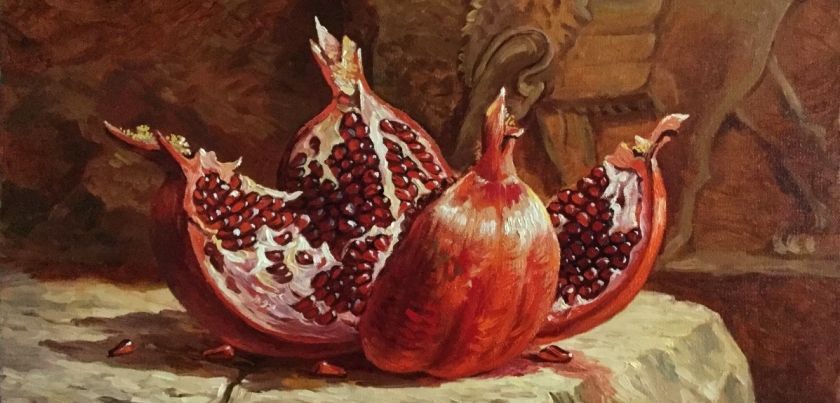 In this suspenseful mystery by Edith Wharton, a young woman marries a recently widowed man who admits to having been intensely in love with his deceased wife of twelve years. Everything seems perfect until a series of strange letters arrive, addressed to the husband in obviously feminine handwriting. The letters deeply disturb the husband, who refuses to disclose the sender or the contents. When the husband disappears and the secret of the letters is revealed, it appears that his dead wife may have won a ghostly contest. Themes: love, family, jealousy, honesty and mutual trust in marriage, alienation, he supernatural. More…
In this suspenseful mystery by Edith Wharton, a young woman marries a recently widowed man who admits to having been intensely in love with his deceased wife of twelve years. Everything seems perfect until a series of strange letters arrive, addressed to the husband in obviously feminine handwriting. The letters deeply disturb the husband, who refuses to disclose the sender or the contents. When the husband disappears and the secret of the letters is revealed, it appears that his dead wife may have won a ghostly contest. Themes: love, family, jealousy, honesty and mutual trust in marriage, alienation, he supernatural. More…
Hot Ice
 Major themes of this story by Stuart Dybek are urban decay and social change. The state of a 1970s Chicago neighbourhood is reflected in the desolate, drug and alcohol-fueled lives of the story’s main characters. A prison, which features prominently in the story, signifies their bleak chances of escaping these circumstances. The story is tied together by an urban myth about a “saintly” girl encased in a block of ice. Her rescue and “release” symbolizes hope for change and a better future. Other themes include religion, loss, grief, coming of age, identity, nostalgia, despair, drug and alcohol abuse, myth. More…
Major themes of this story by Stuart Dybek are urban decay and social change. The state of a 1970s Chicago neighbourhood is reflected in the desolate, drug and alcohol-fueled lives of the story’s main characters. A prison, which features prominently in the story, signifies their bleak chances of escaping these circumstances. The story is tied together by an urban myth about a “saintly” girl encased in a block of ice. Her rescue and “release” symbolizes hope for change and a better future. Other themes include religion, loss, grief, coming of age, identity, nostalgia, despair, drug and alcohol abuse, myth. More…
The Willow Walk
 In this story by Sinclair Lewis, twins Jasper and John Holt couldn’t be more different: Jasper, a well-dressed, respectable bank teller and admired member of a community theatre group; John, a disheveled, reclusive religious fanatic and admired member of an obscure religious cult. Yet they are the same person, a skilled actor carrying out an elaborate bank heist. The robbery goes off perfectly… “Jasper” mysteriously disappears, and John, who no one suspects, has the money. All goes well until John’s conscience causes him to descend into madness. Themes include crime, dissimulation, social class, religious zealotry, guilt, madness, atonement, despair. More…
In this story by Sinclair Lewis, twins Jasper and John Holt couldn’t be more different: Jasper, a well-dressed, respectable bank teller and admired member of a community theatre group; John, a disheveled, reclusive religious fanatic and admired member of an obscure religious cult. Yet they are the same person, a skilled actor carrying out an elaborate bank heist. The robbery goes off perfectly… “Jasper” mysteriously disappears, and John, who no one suspects, has the money. All goes well until John’s conscience causes him to descend into madness. Themes include crime, dissimulation, social class, religious zealotry, guilt, madness, atonement, despair. More…
Victory Over Japan
 Today we are featuring the trilogy of “Rhoda” stories from Ellen Gilchrist’s short story collection Victory Over Japan. In the titular first story, set in the final days of World War 2, Rhoda is a willful third-grader living in fear of when her disciplinarian father returns home from the war. In the second story, Music, she is a rebellious fourteen-year-old, obsessed with beauty and romance and constantly at war with her father. In the final story, The Lower Garden District Free Gravity Mule Blight or Rhoda, a Fable, she is a lost thirty-four-year-old at a crossroads. More…
Today we are featuring the trilogy of “Rhoda” stories from Ellen Gilchrist’s short story collection Victory Over Japan. In the titular first story, set in the final days of World War 2, Rhoda is a willful third-grader living in fear of when her disciplinarian father returns home from the war. In the second story, Music, she is a rebellious fourteen-year-old, obsessed with beauty and romance and constantly at war with her father. In the final story, The Lower Garden District Free Gravity Mule Blight or Rhoda, a Fable, she is a lost thirty-four-year-old at a crossroads. More…
What Men Live By
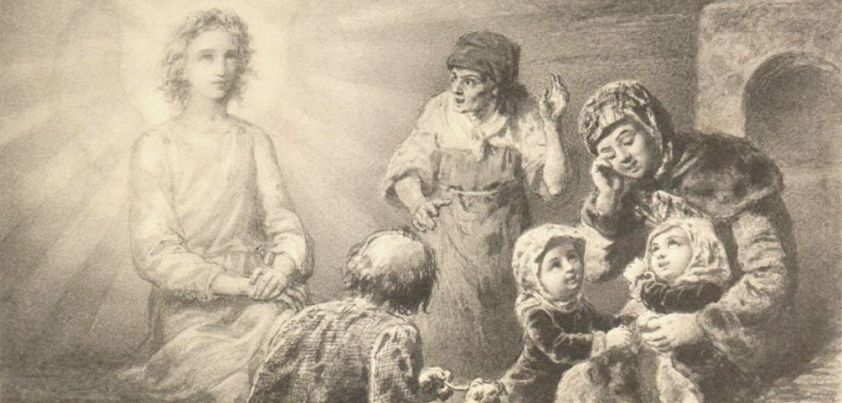 In this story by Leo Tolstoy, God punishes a disobedient angel by casting him out of Heaven to live as a man. The only way he can get his job back is to learn the answers these questions: What dwells in man? What is not given to man? and What (do) men live by? He learns the answers from the family of a poor but compassionate shoemaker, an imperious rich man, and a kind, charitable woman who has adopted the two orphaned children of a dead neighbor. Themes: humanity, compassion, kindness, arrogance, duty, death. More…
In this story by Leo Tolstoy, God punishes a disobedient angel by casting him out of Heaven to live as a man. The only way he can get his job back is to learn the answers these questions: What dwells in man? What is not given to man? and What (do) men live by? He learns the answers from the family of a poor but compassionate shoemaker, an imperious rich man, and a kind, charitable woman who has adopted the two orphaned children of a dead neighbor. Themes: humanity, compassion, kindness, arrogance, duty, death. More…
Leaving the Yellow House
 In this depressing but captivating story by Saul Bellow, a seventy-two-year-old woman reviews her life of lost opportunities after an accident threatens her ability to live independently in her off-the-grid Yellow House. A heavy drinker, she is portrayed as irresponsible, selfish, brash and demanding. With no close relatives and the six other eccentric white people in her isolated desert community tolerating rather than befriending her, she has no one to turn to and, more importantly, nobody “good enough” to bequeath her only treasure (the house) to. Themes include poverty, aging and death, identity, self-deception, alienation and isolation, disconnection, alcohol abuse. More…
In this depressing but captivating story by Saul Bellow, a seventy-two-year-old woman reviews her life of lost opportunities after an accident threatens her ability to live independently in her off-the-grid Yellow House. A heavy drinker, she is portrayed as irresponsible, selfish, brash and demanding. With no close relatives and the six other eccentric white people in her isolated desert community tolerating rather than befriending her, she has no one to turn to and, more importantly, nobody “good enough” to bequeath her only treasure (the house) to. Themes include poverty, aging and death, identity, self-deception, alienation and isolation, disconnection, alcohol abuse. More…
Halfway to the Moon
 In this story by Vasily Aksyonov (Aksenov), a hard-drinking Russian logging-truck driver is infatuated with a stylish stewardess he meets on a flight to Moscow. He becomes so obsessed with finding her again that he spends his entire winter vacation traveling to and fro on the same flight. Disillusioned over the fruitless search, he has a moral awakening and develops feelings of guilt over a woman he had recently misled. When he does see the stewardess again, he decides to walk away and treasure the memory. Themes include machismo, unrequited love, disillusionment, moral conscience, Western influence on Russian culture. More…
In this story by Vasily Aksyonov (Aksenov), a hard-drinking Russian logging-truck driver is infatuated with a stylish stewardess he meets on a flight to Moscow. He becomes so obsessed with finding her again that he spends his entire winter vacation traveling to and fro on the same flight. Disillusioned over the fruitless search, he has a moral awakening and develops feelings of guilt over a woman he had recently misled. When he does see the stewardess again, he decides to walk away and treasure the memory. Themes include machismo, unrequited love, disillusionment, moral conscience, Western influence on Russian culture. More…
The Learned Adventure of the Dragon’s Head
 Lord Peter Wimsey, Dorothy Sayers’s eccentric amateur sleuth, is saddled with his ten-year-old nephew while his parents are away overseas. As the two browse an antiquarian bookshop, the boy is attracted to the maps and pictures in a badly damaged copy of Cosmographia Universalis, an early description of the world. He buys the book, and shortly afterwards a strange man visits and offers Wimsey two hundred times what the boy paid. This leads to a “Boys Own” type adventure involving attempted robbery, Scotland Yard and a riddle leading to buried pirate treasure. Themes include curiosity, greed, mystery, deception, and philanthropy. More…
Lord Peter Wimsey, Dorothy Sayers’s eccentric amateur sleuth, is saddled with his ten-year-old nephew while his parents are away overseas. As the two browse an antiquarian bookshop, the boy is attracted to the maps and pictures in a badly damaged copy of Cosmographia Universalis, an early description of the world. He buys the book, and shortly afterwards a strange man visits and offers Wimsey two hundred times what the boy paid. This leads to a “Boys Own” type adventure involving attempted robbery, Scotland Yard and a riddle leading to buried pirate treasure. Themes include curiosity, greed, mystery, deception, and philanthropy. More…
A Circle in the Fire
 In this story by Flannery O’Connor, a self-righteous widow who runs a large farm with an iron hand is visited by three teenage boys. One of them is the son of an ex-employee, ostensibly seeking a horse ride. She refuses the request, but allows them to camp overnight. The next morning, angered by her condescending attitude, the boys do not leave and spend the next two days committing petty acts of vandalism around the farm. A threat to call the sheriff results in her greatest fear: fire. Themes include authoritarianism, pride, fear, false piety, ignorance, resentment, defiance, powerlessness. More…
In this story by Flannery O’Connor, a self-righteous widow who runs a large farm with an iron hand is visited by three teenage boys. One of them is the son of an ex-employee, ostensibly seeking a horse ride. She refuses the request, but allows them to camp overnight. The next morning, angered by her condescending attitude, the boys do not leave and spend the next two days committing petty acts of vandalism around the farm. A threat to call the sheriff results in her greatest fear: fire. Themes include authoritarianism, pride, fear, false piety, ignorance, resentment, defiance, powerlessness. More…
The Canterville Ghost
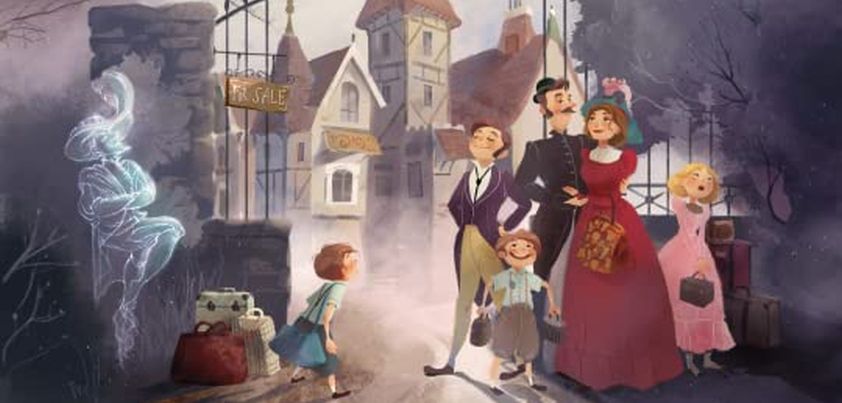 Oscar Wilde is known for his comedic, usually satirical stories that focus on the shallowness and hypocrisy of the Victorian upper class. He goes several steps further in this playful ghost story, also mocking the brash practicality of wealthy Americans and some of the common devices used in horror and romantic literature. A fascinating aspect of the plot is the way Wilde builds sympathy for his spectral protagonist before revealing the petty reason the cruel man murdered his unfortunate wife. Themes: (general) British vs American culture, tradition, compassion; (the ghost) duty, artistry, suffering, atonement, redemption, peace. More…
Oscar Wilde is known for his comedic, usually satirical stories that focus on the shallowness and hypocrisy of the Victorian upper class. He goes several steps further in this playful ghost story, also mocking the brash practicality of wealthy Americans and some of the common devices used in horror and romantic literature. A fascinating aspect of the plot is the way Wilde builds sympathy for his spectral protagonist before revealing the petty reason the cruel man murdered his unfortunate wife. Themes: (general) British vs American culture, tradition, compassion; (the ghost) duty, artistry, suffering, atonement, redemption, peace. More…
Youth
 This story from Joseph Conrad is more than a survival tale about an unseaworthy ship beset by bad luck. Central themes are youthful exuberance bordering on recklessness, regret for its passing, and the romance of the sea. The explosion that sinks the vessel marks a turning point for a young ship’s officer. Up until then, his enthusiasm had been fueled by a youthful desire to experience the wonders of the East. He discovers a new side of himself (leadership ability) when he temporarily takes command of the crew’s evacuation to the lifeboats. Other themes: courage, duty, misfortune, survival, self-discovery, pride. More…
This story from Joseph Conrad is more than a survival tale about an unseaworthy ship beset by bad luck. Central themes are youthful exuberance bordering on recklessness, regret for its passing, and the romance of the sea. The explosion that sinks the vessel marks a turning point for a young ship’s officer. Up until then, his enthusiasm had been fueled by a youthful desire to experience the wonders of the East. He discovers a new side of himself (leadership ability) when he temporarily takes command of the crew’s evacuation to the lifeboats. Other themes: courage, duty, misfortune, survival, self-discovery, pride. More…
The Argentine Ant
 This story from Italo Calvino starts off aslike a horror story. A young couple with a baby move to a peaceful seaside village looking for work, only to discover that the whole place is crawling with ants. After they find the baby covered in ants and their food destroyed, Calvino takes a playful turn. He goes on to describe the sometimes farcical ways villagers try to exterminate and/or pretend they are not affected by the invaders, and the couple’s embarrassing confrontation with the reportedly self-serving government “Ant Man”. Themes: co-existing with nature, powerlessness, futility, tolerance/accepting the inevitable, mob hysteria. More…
This story from Italo Calvino starts off aslike a horror story. A young couple with a baby move to a peaceful seaside village looking for work, only to discover that the whole place is crawling with ants. After they find the baby covered in ants and their food destroyed, Calvino takes a playful turn. He goes on to describe the sometimes farcical ways villagers try to exterminate and/or pretend they are not affected by the invaders, and the couple’s embarrassing confrontation with the reportedly self-serving government “Ant Man”. Themes: co-existing with nature, powerlessness, futility, tolerance/accepting the inevitable, mob hysteria. More…
Old Love
 In this story by Jeffrey Archer, a couple go from rivalry-inspired hatred at first sight to literally being unable to live without each other. From the time they meet as Oxford undergraduates in the 1930s, a fierce sense of competition between the gifted pair spurs them on to topping their class, attaining coveted professorships, and earning royal honours. After tragedy brings them together, the caustic relationship morphs into a life-long love affair during which legend has it they were never apart for more than a few hours. Themes include competiveness, lasting love, literature and the arts, dedication, achievement. More…
In this story by Jeffrey Archer, a couple go from rivalry-inspired hatred at first sight to literally being unable to live without each other. From the time they meet as Oxford undergraduates in the 1930s, a fierce sense of competition between the gifted pair spurs them on to topping their class, attaining coveted professorships, and earning royal honours. After tragedy brings them together, the caustic relationship morphs into a life-long love affair during which legend has it they were never apart for more than a few hours. Themes include competiveness, lasting love, literature and the arts, dedication, achievement. More…
A Small, Good Thing
 In this heart-wrenching story by Raymond Carver, parents mount a vigil by their unconscious son’s hospital bed after he was struck by a car on his eighth birthday. On the few occasions one of them goes home to freshen up and feed the family dog, they receive prank phone calls, often mentioning the boy’s name. The boy dies after three days, but the calls continue. The mother soon realizes the caller is a baker from whom she had ordered a birthday cake, and insists on immediately confronting the man. Themes include family, tragedy, helplessness and isolation, compassion, connection, loneliness, forgiveness. More…
In this heart-wrenching story by Raymond Carver, parents mount a vigil by their unconscious son’s hospital bed after he was struck by a car on his eighth birthday. On the few occasions one of them goes home to freshen up and feed the family dog, they receive prank phone calls, often mentioning the boy’s name. The boy dies after three days, but the calls continue. The mother soon realizes the caller is a baker from whom she had ordered a birthday cake, and insists on immediately confronting the man. Themes include family, tragedy, helplessness and isolation, compassion, connection, loneliness, forgiveness. More…
Secret Worship
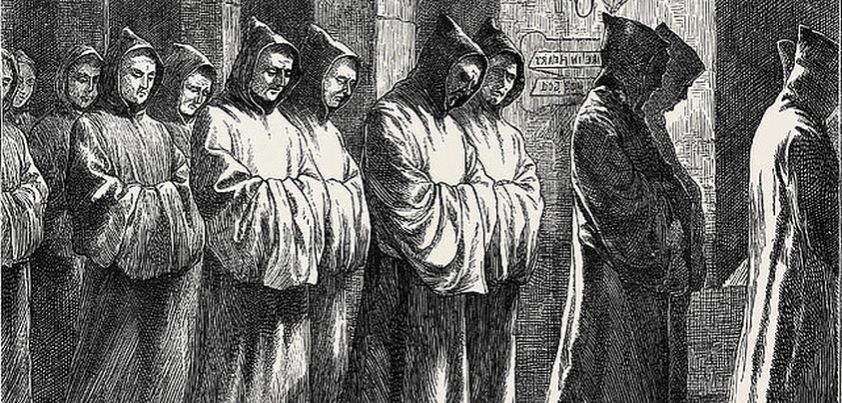 In this story by Algernon Blackwood, a man makes a spur of the moment decision to visit his old boarding school in a remote German village. Although life and discipline inside the fortress-like school operated by a devout Protestant brotherhood was strict, he recalls his time there fondly. When he arrives, everything appears unchanged and he is welcomed with open arms. However, leaving is not so easy… the not-so-devout brotherhood was a cover for a satanic cult which now has eyes on his soul! Themes include nostalgia, isolation, appearances vs. reality, satanism, human sacrifice, chance, the supernatural. More…
In this story by Algernon Blackwood, a man makes a spur of the moment decision to visit his old boarding school in a remote German village. Although life and discipline inside the fortress-like school operated by a devout Protestant brotherhood was strict, he recalls his time there fondly. When he arrives, everything appears unchanged and he is welcomed with open arms. However, leaving is not so easy… the not-so-devout brotherhood was a cover for a satanic cult which now has eyes on his soul! Themes include nostalgia, isolation, appearances vs. reality, satanism, human sacrifice, chance, the supernatural. More…
Odour of Chrysanthemums
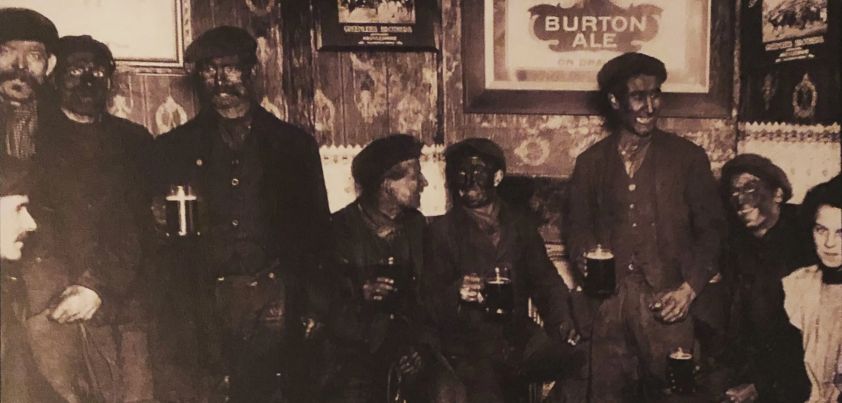 D. H. Lawrence’s Odour of Chrysanthemums begins with an introduction to a woman living in a coal-mining village who feels trapped in an unhappy world of her husband’s making. Although her father is working-class (an engine-driver), her speech and behavior suggest that she aspires to a better life. The accidental death of her husband (a miner) triggers an epiphany in which she realizes that they never really knew each other, and that their problems were equally of her own making. The main theme is superficial (physical) attraction vs. love. Other themes: industrialization, social class, sex roles, isolation, mother-child connections, death. More…
D. H. Lawrence’s Odour of Chrysanthemums begins with an introduction to a woman living in a coal-mining village who feels trapped in an unhappy world of her husband’s making. Although her father is working-class (an engine-driver), her speech and behavior suggest that she aspires to a better life. The accidental death of her husband (a miner) triggers an epiphany in which she realizes that they never really knew each other, and that their problems were equally of her own making. The main theme is superficial (physical) attraction vs. love. Other themes: industrialization, social class, sex roles, isolation, mother-child connections, death. More…
The Ghost upon the Rail
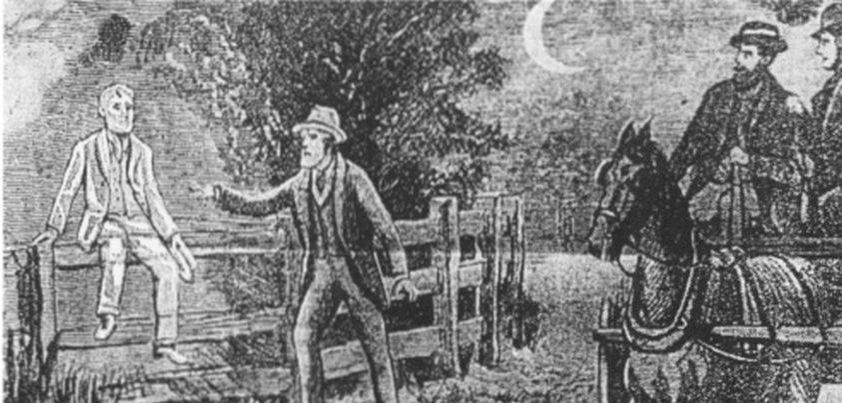 This supposedly true story by John Lang is set in the early 1800s. John Fisher had come to Australia as a convict. He worked hard, won his freedom and became rich. One day a neighbor tells everyone that Fisher has returned to England. A year later, he says that Fisher has written asking him to sell all he owns and send the money to him. According to this version, at about the same time three men (one a policeman) are returning home late one night. Sitting on a rail beside the road is Fisher’s ghost. This spoils the neighbor’s plan. More…
This supposedly true story by John Lang is set in the early 1800s. John Fisher had come to Australia as a convict. He worked hard, won his freedom and became rich. One day a neighbor tells everyone that Fisher has returned to England. A year later, he says that Fisher has written asking him to sell all he owns and send the money to him. According to this version, at about the same time three men (one a policeman) are returning home late one night. Sitting on a rail beside the road is Fisher’s ghost. This spoils the neighbor’s plan. More…
Interpreter of Maladies
 Interpreter of Maladies is the titular tale in Jhumpa Lahiri’s award-winning debut short story collection. The stories deal with different aspects of the cultural and relationship issues facing people of Indian heritage in the modern world. This story contrasts two empty marriages. The Indian protagonist (a doctor’s translator who moonlights as a tour guide) fantasizes that the wife in an Indian-American family he takes sightseeing has a romantic interest in him. Rather than love, she wants his help to find a “cure” for a foolish mistake she once made. Themes include marriage, communication, poor parenting, loss, guilt, loneliness, self-esteem. More…
Interpreter of Maladies is the titular tale in Jhumpa Lahiri’s award-winning debut short story collection. The stories deal with different aspects of the cultural and relationship issues facing people of Indian heritage in the modern world. This story contrasts two empty marriages. The Indian protagonist (a doctor’s translator who moonlights as a tour guide) fantasizes that the wife in an Indian-American family he takes sightseeing has a romantic interest in him. Rather than love, she wants his help to find a “cure” for a foolish mistake she once made. Themes include marriage, communication, poor parenting, loss, guilt, loneliness, self-esteem. More…
The Mill
 The major theme of his story by H. E. Bates is exploitation: economic exploitation by parents who place their daughter in servitude, and sexual exploitation by her employer who rapes her on an almost daily basis. The most puzzling aspect of the story is the girl’s compliant, almost robot-like, demeanor, perhaps brought about by her father’s dictatorial bullying. It only when the girl arrives home after her employer’s son, the only man who has shown her any kindness, realises and tells her she is pregnant, that her eyes come to life with tears. Other themes include isolation, naivety, jealousy, fear. More…
The major theme of his story by H. E. Bates is exploitation: economic exploitation by parents who place their daughter in servitude, and sexual exploitation by her employer who rapes her on an almost daily basis. The most puzzling aspect of the story is the girl’s compliant, almost robot-like, demeanor, perhaps brought about by her father’s dictatorial bullying. It only when the girl arrives home after her employer’s son, the only man who has shown her any kindness, realises and tells her she is pregnant, that her eyes come to life with tears. Other themes include isolation, naivety, jealousy, fear. More…
A Boy and His Dog
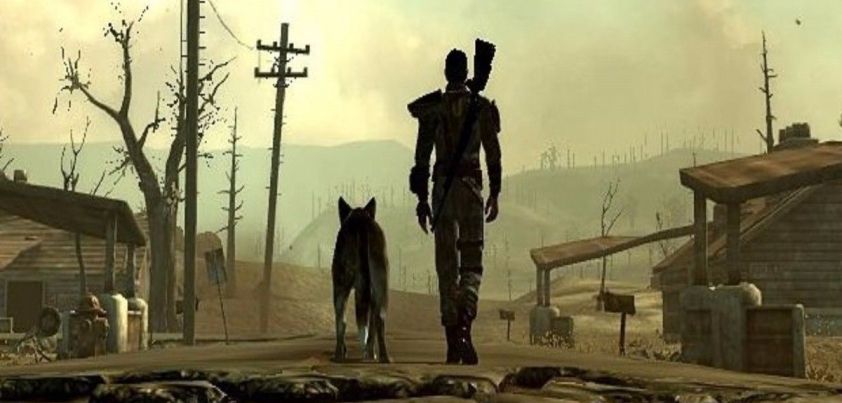 Written at the peak of the Cold War, this Harlan Ellison story takes place in a dystopic, post-apocalyptic world. ‘Civilized’ people have retreated to secure underground cities, leaving the desolate surface to ‘solo’ wanderers and lawless gangs who survive by foraging, violence and murder. The plot involves a young solo, his genetically manipulated telepathic dog, and an attractive young woman from the underground who almost comes between them. Despite the title, there is nothing “boyish” about the protagonist given what he and the girl get up to! Themes: anarchy, division, violence, loyalty, manipulation, betrayal, love. More…
Written at the peak of the Cold War, this Harlan Ellison story takes place in a dystopic, post-apocalyptic world. ‘Civilized’ people have retreated to secure underground cities, leaving the desolate surface to ‘solo’ wanderers and lawless gangs who survive by foraging, violence and murder. The plot involves a young solo, his genetically manipulated telepathic dog, and an attractive young woman from the underground who almost comes between them. Despite the title, there is nothing “boyish” about the protagonist given what he and the girl get up to! Themes: anarchy, division, violence, loyalty, manipulation, betrayal, love. More…
The Open Boat
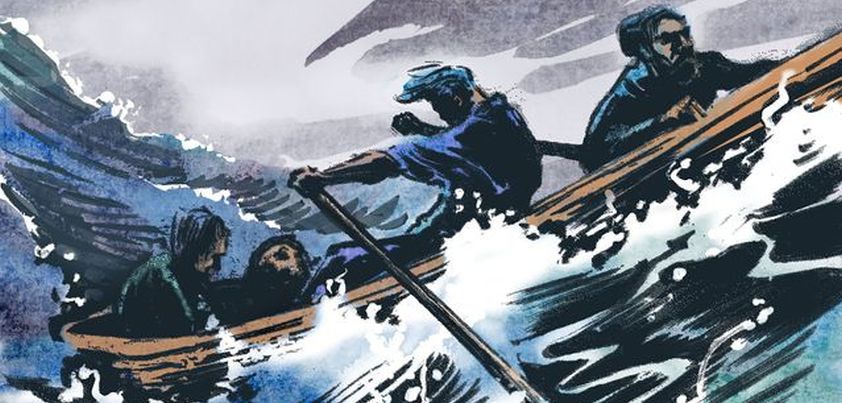 A remarkable aspect of this story from Stephen Crane is that it is based on an actual event in the author’s life. This adds credibility to what to me is a defining feature of the story: the way that throughout the ordeal four men from such diverse backgrounds were able to maintain their self-discipline and work so well together. The Open Boat is considered a classic in the literary style called “naturalism”. Such stories deal with the unforgiving power of nature and man’s struggle for survival. Themes: man vs. nature/the sea, perspective (appearance vs. reality), courage, teamwork, survival. More…
A remarkable aspect of this story from Stephen Crane is that it is based on an actual event in the author’s life. This adds credibility to what to me is a defining feature of the story: the way that throughout the ordeal four men from such diverse backgrounds were able to maintain their self-discipline and work so well together. The Open Boat is considered a classic in the literary style called “naturalism”. Such stories deal with the unforgiving power of nature and man’s struggle for survival. Themes: man vs. nature/the sea, perspective (appearance vs. reality), courage, teamwork, survival. More…
The Gentleman from San Francisco
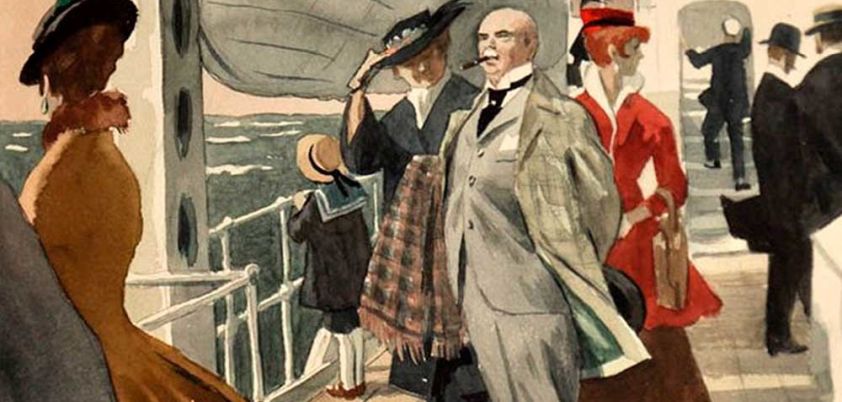 In this story by Ivan Bunin an overweight, fifty-eight-year-old industrialist who had grown rich off the sweat of Chinese immigrants treats himself and his family to a two-year trip around the world. He only makes it as far as Capri, where he dies of a heart attack. The story is a biting satire of the opulent lifestyles and arrogance of the mega-rich, living in their ivory towers indifferent to the “lesser” people who toil to make their lifestyles possible. Themes include greed, social class, vanity, superficiality, moral decay, self-aggrandizement vs. spiritual enlightenment, death as a leveler. More…
In this story by Ivan Bunin an overweight, fifty-eight-year-old industrialist who had grown rich off the sweat of Chinese immigrants treats himself and his family to a two-year trip around the world. He only makes it as far as Capri, where he dies of a heart attack. The story is a biting satire of the opulent lifestyles and arrogance of the mega-rich, living in their ivory towers indifferent to the “lesser” people who toil to make their lifestyles possible. Themes include greed, social class, vanity, superficiality, moral decay, self-aggrandizement vs. spiritual enlightenment, death as a leveler. More…
Nightfall
 As once described by Isaac Asimov himself, Nightfall (is) the tale of a world with eternal sun that is suddenly plunged into total darkness and utter madness. Hailed as one of the greatest Science Fiction stories ever written it tells how, in preparation for the potential end of their civilization, a group of forward-thinking scientists have created a safe place to store their world’s accumulated knowledge and hide a select group of “survivors”. Themes: science vs superstition (cultism), having the courage of one’s convictions, sensory deprivation, insanity, mob hysteria, scientific hubris. More…
As once described by Isaac Asimov himself, Nightfall (is) the tale of a world with eternal sun that is suddenly plunged into total darkness and utter madness. Hailed as one of the greatest Science Fiction stories ever written it tells how, in preparation for the potential end of their civilization, a group of forward-thinking scientists have created a safe place to store their world’s accumulated knowledge and hide a select group of “survivors”. Themes: science vs superstition (cultism), having the courage of one’s convictions, sensory deprivation, insanity, mob hysteria, scientific hubris. More…
The Railroad and the Churchyard
 In this story by Bjørnstjerne Bjørnson two friends fall out over a proposal to sell the public grain magazine and establish a community savings bank. The decision (to sell the magazine) brings prosperity to all. Years later, as many in the parish face financial ruin due to speculation, the two clash again over a proposal to allow a new railway to pass through the town. Although the railway will increase land values, the only route possible includes part of an old, disused cemetery. This leads to a fiery ending. Themes include friendship, tradition vs. progress, conflicts of interest, desperation, community. More…
In this story by Bjørnstjerne Bjørnson two friends fall out over a proposal to sell the public grain magazine and establish a community savings bank. The decision (to sell the magazine) brings prosperity to all. Years later, as many in the parish face financial ruin due to speculation, the two clash again over a proposal to allow a new railway to pass through the town. Although the railway will increase land values, the only route possible includes part of an old, disused cemetery. This leads to a fiery ending. Themes include friendship, tradition vs. progress, conflicts of interest, desperation, community. More…
Journey into a Dark Heart
 In this story by Peter Høeg, a naïve young mathematician becomes disillusioned at the impossibility of reducing all things (including humanity) to a set of equations. He gives up his academic career, joins a Danish trading company, and finds himself in Africa mixing with royalty at the opening of a new railroad. During the inaugural train journey, he discusses European notions of colonial Africa with three fellow passengers. He later learns that one is a rebel leader, another a gunrunner, and a bridge ahead has been sabotaged. Themes: colonialism, race and racism, war/rebellion, honesty, idealism vs. reality, despair. More…
In this story by Peter Høeg, a naïve young mathematician becomes disillusioned at the impossibility of reducing all things (including humanity) to a set of equations. He gives up his academic career, joins a Danish trading company, and finds himself in Africa mixing with royalty at the opening of a new railroad. During the inaugural train journey, he discusses European notions of colonial Africa with three fellow passengers. He later learns that one is a rebel leader, another a gunrunner, and a bridge ahead has been sabotaged. Themes: colonialism, race and racism, war/rebellion, honesty, idealism vs. reality, despair. More…
Five-Twenty
 In this story by Patrick White, a woman with very low self-esteem spends her life at the beck and call of a rancorous, dominating husband. As they age and he gradually wastes away, they spend their days “traffic watching” from the veranda of their small house on a busy road. She becomes obsessed with a strange-looking man who drives by at five-twenty every day and, following a chance meeting after her husband dies, experiences what may be her first passionate stirrings. Sadly, death comes between them. Themes include patriarchy, gender roles, aging, loneliness, lack of passion and fulfilment, freedom, loss. More…
In this story by Patrick White, a woman with very low self-esteem spends her life at the beck and call of a rancorous, dominating husband. As they age and he gradually wastes away, they spend their days “traffic watching” from the veranda of their small house on a busy road. She becomes obsessed with a strange-looking man who drives by at five-twenty every day and, following a chance meeting after her husband dies, experiences what may be her first passionate stirrings. Sadly, death comes between them. Themes include patriarchy, gender roles, aging, loneliness, lack of passion and fulfilment, freedom, loss. More…
In the Zoo
 In this story by Jean Stafford, a sorry-looking blind polar bear in a Denver zoo reminds adult sisters of a gentle alcoholic ne’er-do-well who befriended them during their traumatic childhood. As eight and ten year-old orphans, the two were fostered out to “Gran”, a possessive, unloving, scornful woman who runs a boarding house. Academically backward and teased at school, they find comfort in their friendship with a kindly Irishman and a puppy he gives them. That is until Gran converts the loveable pup into a ferocious attack dog. Themes include arranged psychological trauma, isolation, confinement and control, companionship and love. More…
In this story by Jean Stafford, a sorry-looking blind polar bear in a Denver zoo reminds adult sisters of a gentle alcoholic ne’er-do-well who befriended them during their traumatic childhood. As eight and ten year-old orphans, the two were fostered out to “Gran”, a possessive, unloving, scornful woman who runs a boarding house. Academically backward and teased at school, they find comfort in their friendship with a kindly Irishman and a puppy he gives them. That is until Gran converts the loveable pup into a ferocious attack dog. Themes include arranged psychological trauma, isolation, confinement and control, companionship and love. More…
Diary of a Madman
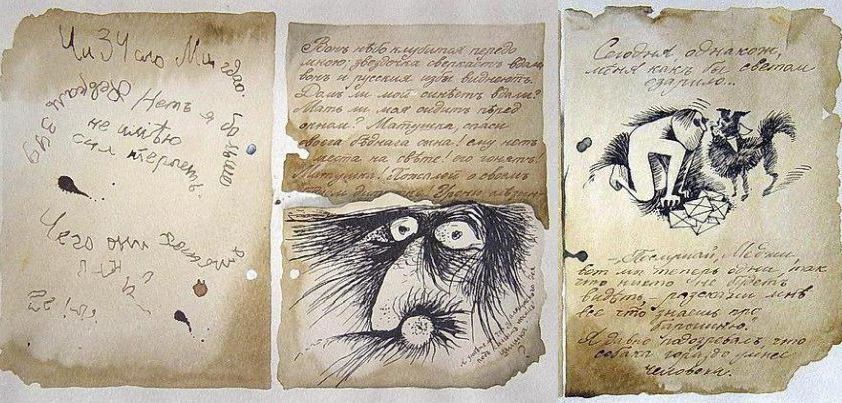 This humorous story from Nikolai Gogol charts the descent of a government clerk into insanity. He dismisses his supervisor’s concerns about strange behavior as jealousy, becomes infatuated with his Department Head’s daughter, stalks the poor girl after overhearing a conversation between two dogs, reads their (the dogs’) letters, and finally suffers delusions of grandeur, believing himself to be the King of Spain. In the process, the story satirizes Russia’s bureaucratic wastefulness and obsession with titles and social status. The major theme is, of course, madness. Other themes: purposeless work, alienation, envy, wounded pride, class and (in the asylum) cruelty, suffering. More…
This humorous story from Nikolai Gogol charts the descent of a government clerk into insanity. He dismisses his supervisor’s concerns about strange behavior as jealousy, becomes infatuated with his Department Head’s daughter, stalks the poor girl after overhearing a conversation between two dogs, reads their (the dogs’) letters, and finally suffers delusions of grandeur, believing himself to be the King of Spain. In the process, the story satirizes Russia’s bureaucratic wastefulness and obsession with titles and social status. The major theme is, of course, madness. Other themes: purposeless work, alienation, envy, wounded pride, class and (in the asylum) cruelty, suffering. More…
The Murders in the Rue Morgue
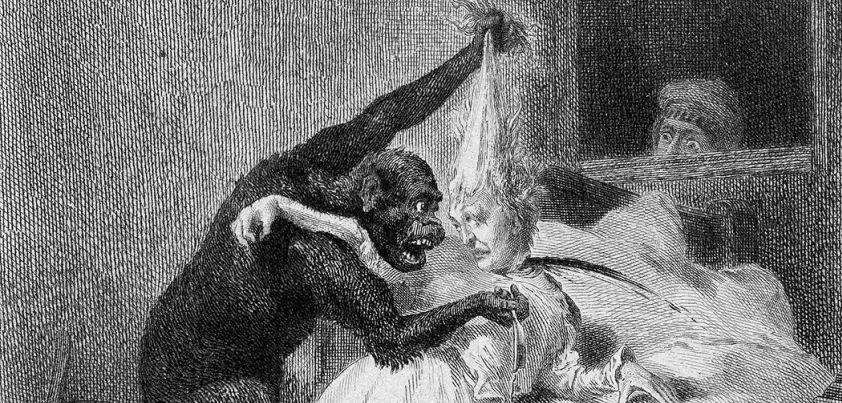 Written in 1841, this rather unlikely story by Edgar Allan Poe is considered one of the world’s first modern detective stories. In a seemingly insoluble locked-room mystery, the wrong man is arrested for the violent murder of two women. In an effort to find the truth, Poe’s amateur detective Dupin demonstrates the importance of “mental analysis” in problem solving and, in the process, shows how an “Ourang-Outang” was able to make a monkey out of the police. Themes include ingenuity (inventiveness) vs. mental analysis (critical thinking), violence, the pursuit of truth, justice. More…
Written in 1841, this rather unlikely story by Edgar Allan Poe is considered one of the world’s first modern detective stories. In a seemingly insoluble locked-room mystery, the wrong man is arrested for the violent murder of two women. In an effort to find the truth, Poe’s amateur detective Dupin demonstrates the importance of “mental analysis” in problem solving and, in the process, shows how an “Ourang-Outang” was able to make a monkey out of the police. Themes include ingenuity (inventiveness) vs. mental analysis (critical thinking), violence, the pursuit of truth, justice. More…
The News from Ireland
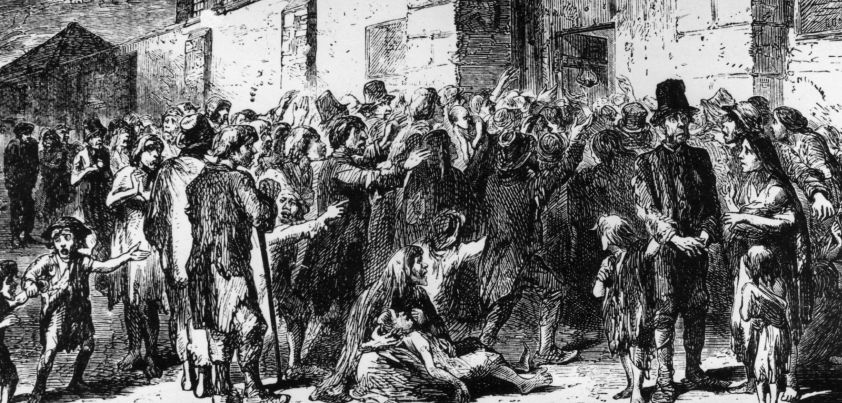 This story from William Trevor is set during the Irish Potato Famine of the 1840s. It contrasts the comfortable lives of those living behind the walls of a large English-owned estate with the misery of the rural poor. The issues are considered from multiple points of view, including those of servants and staff. Two major themes are acceptance and complacency. Although the plight of the rural poor initially disturbs newcomers, they soon become desensitized to the suffering, considering it a normal aspect of Irish life. Other themes: the gap between rich and poor, heritage, gender roles, religious faith and conflict. More…
This story from William Trevor is set during the Irish Potato Famine of the 1840s. It contrasts the comfortable lives of those living behind the walls of a large English-owned estate with the misery of the rural poor. The issues are considered from multiple points of view, including those of servants and staff. Two major themes are acceptance and complacency. Although the plight of the rural poor initially disturbs newcomers, they soon become desensitized to the suffering, considering it a normal aspect of Irish life. Other themes: the gap between rich and poor, heritage, gender roles, religious faith and conflict. More…
Bartleby the Scrivener: A Tale of Wall Street
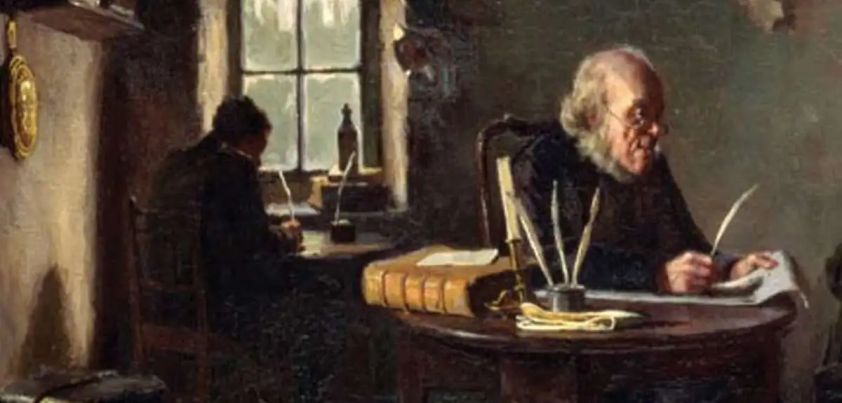 Herman Melville’s Bartleby the Scrivener is regarded as a classic of Modern Literature. A major theme is the depression that comes with being alone in the world and lacking a purpose in life. Other themes include exploitation, insensitivity and guilt (the Lawyer), conformity and coping with boring, repetitive work (Turkey and Nipper), alienation, apathy and passive resistance to one’s responsibilities (Bartleby), and loss of hope and the inevitability of death (symbolized by the Dead Letter Office). The Lawyer’s final words, Ah, Bartleby! Ah, humanity!, reflect the irony of Bartleby finding himself in the two worst possible jobs for his disposition. More…
Herman Melville’s Bartleby the Scrivener is regarded as a classic of Modern Literature. A major theme is the depression that comes with being alone in the world and lacking a purpose in life. Other themes include exploitation, insensitivity and guilt (the Lawyer), conformity and coping with boring, repetitive work (Turkey and Nipper), alienation, apathy and passive resistance to one’s responsibilities (Bartleby), and loss of hope and the inevitability of death (symbolized by the Dead Letter Office). The Lawyer’s final words, Ah, Bartleby! Ah, humanity!, reflect the irony of Bartleby finding himself in the two worst possible jobs for his disposition. More…
Boule de Suif / Ball of Fat
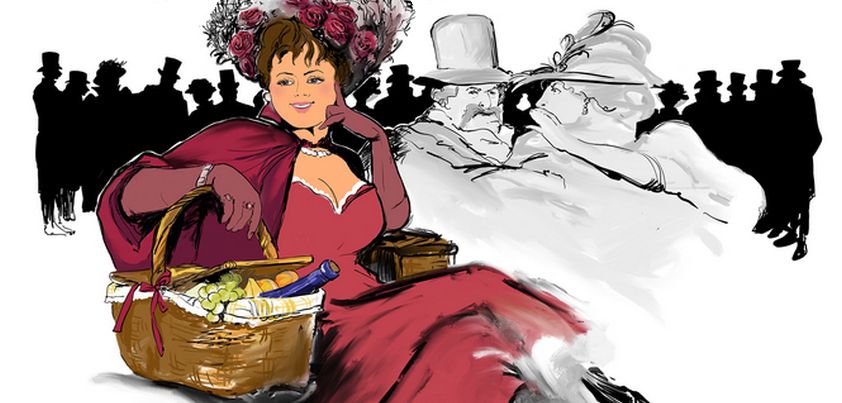 Regarded as one of Guy de Maupassant’s greatest works, this story explores the interactions between a prostitute with the unfortunate nickname Boule de Suif (Ball of Fat) and nine other coach passengers fleeing the Franco-Prussian War. Her fellow travelers comprise a cross-section of “respectable” French society: politics, business, the nobility and religion. Maupassant’s sad message about nineteenth-century France is that no matter what shows of kindness or sacrifices people of the lower classes make, they are unlikely to be treated with respect and dignity by those of higher social standing. Themes: social class, patriotism, manipulation, exploitation, sacrifice/moral compromise, ingratitude, hypocrisy. More…
Regarded as one of Guy de Maupassant’s greatest works, this story explores the interactions between a prostitute with the unfortunate nickname Boule de Suif (Ball of Fat) and nine other coach passengers fleeing the Franco-Prussian War. Her fellow travelers comprise a cross-section of “respectable” French society: politics, business, the nobility and religion. Maupassant’s sad message about nineteenth-century France is that no matter what shows of kindness or sacrifices people of the lower classes make, they are unlikely to be treated with respect and dignity by those of higher social standing. Themes: social class, patriotism, manipulation, exploitation, sacrifice/moral compromise, ingratitude, hypocrisy. More…
A Spinster’s Tale
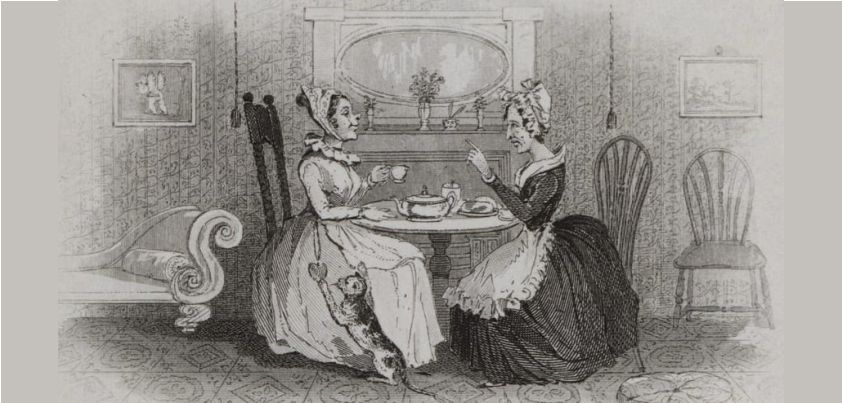 In this story by Peter Taylor, an aged woman looks back at a traumatic period in her youth that may have shaped her life and led to spinsterhood. Her mother’s religious condemnation of alcohol sets the scene for the story. The subsequent loss of her mother following a still-birth, growing up in a (drinking) male-dominated household, and her phobia about the town drunk at a critical period in her life (as she enters puberty) leave her isolated and in fear of the masculine world. Themes include family dynamics, personal growth, isolation and loneliness, fear, cruelty, sexual conflict. More…
In this story by Peter Taylor, an aged woman looks back at a traumatic period in her youth that may have shaped her life and led to spinsterhood. Her mother’s religious condemnation of alcohol sets the scene for the story. The subsequent loss of her mother following a still-birth, growing up in a (drinking) male-dominated household, and her phobia about the town drunk at a critical period in her life (as she enters puberty) leave her isolated and in fear of the masculine world. Themes include family dynamics, personal growth, isolation and loneliness, fear, cruelty, sexual conflict. More…
The Diamond Mine
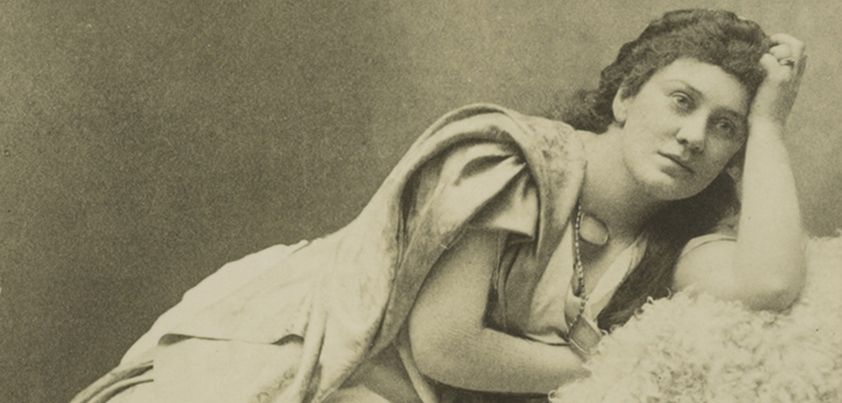 The Diamond Mine in this story by Willa Cather is an internationally renowned opera singer. The story highlights the emotional pressure associated with pursuing art for fame and fortune, rather than for art’s sake alone. The diva derives pleasure from “giving” to her husbands and extended family, most of whom ruthlessly exploit the poor woman. Although happy to bask in her fame, her vitality and success inspires envy and hatred among them. Their indolence and greed leaves her mined out, both financially and emotionally. Themes: the artist as a celebrity, vitality, envy, greed, exploitation, betrayal. More…
The Diamond Mine in this story by Willa Cather is an internationally renowned opera singer. The story highlights the emotional pressure associated with pursuing art for fame and fortune, rather than for art’s sake alone. The diva derives pleasure from “giving” to her husbands and extended family, most of whom ruthlessly exploit the poor woman. Although happy to bask in her fame, her vitality and success inspires envy and hatred among them. Their indolence and greed leaves her mined out, both financially and emotionally. Themes: the artist as a celebrity, vitality, envy, greed, exploitation, betrayal. More…
Young Archimedes
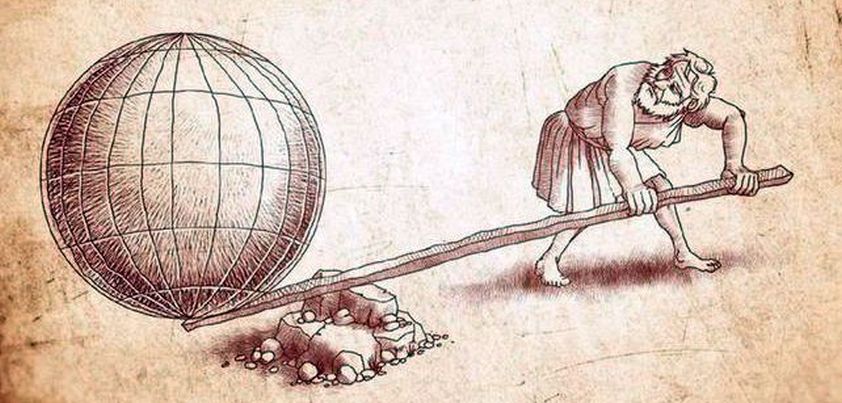 This tragic story from Aldous Huxley is about an English family renting a secluded Italian villa. When their young son is befriended by Guido, the son of a farm-worker, his father notices that in addition to being musically gifted, Guido has the makings of a math prodigy. While the family are holidaying in the Swiss Alps the childless, status-seeking wife of their landlord tricks Guido’s father into letting her take the boy away for musical instruction. The selfish woman tells Guido a terrible lie, with tragic results. Themes: greed, genius, family, class, social status, manipulation, abandonment, suicide. More…
This tragic story from Aldous Huxley is about an English family renting a secluded Italian villa. When their young son is befriended by Guido, the son of a farm-worker, his father notices that in addition to being musically gifted, Guido has the makings of a math prodigy. While the family are holidaying in the Swiss Alps the childless, status-seeking wife of their landlord tricks Guido’s father into letting her take the boy away for musical instruction. The selfish woman tells Guido a terrible lie, with tragic results. Themes: greed, genius, family, class, social status, manipulation, abandonment, suicide. More…
Life in the Iron-Mills
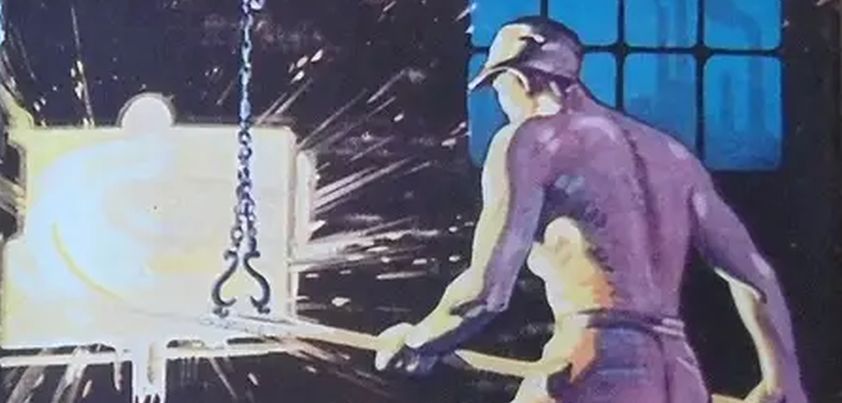 Set in the 1830s, this story by Rebecca Harding Davis highlights the desperate plight of mill and factory workers during the early stages of the industrial revolution. A young furnace attendant, ostracised by other iron-mill workers because of his mild manner and artistic leaning, lives in squalid conditions with his father and a mildly disfigured female cousin. The cousin, whose love for the man is not reciprocated, destroys both of their lives by stealing money to try to help him. Themes include social inequality, exploitation, poverty, artistry, lack of opportunity, unrequited love, crime and punishment, despair, redemption. More…
Set in the 1830s, this story by Rebecca Harding Davis highlights the desperate plight of mill and factory workers during the early stages of the industrial revolution. A young furnace attendant, ostracised by other iron-mill workers because of his mild manner and artistic leaning, lives in squalid conditions with his father and a mildly disfigured female cousin. The cousin, whose love for the man is not reciprocated, destroys both of their lives by stealing money to try to help him. Themes include social inequality, exploitation, poverty, artistry, lack of opportunity, unrequited love, crime and punishment, despair, redemption. More…
Jeffty is Five
 This story by Harlan Ellison is said to be an allegory of the power of childlike fantasy. The protagonist’s childhood friend remains “frozen in time”. As those around him age, the boy retains the body and mind of a five-year-old. Things get stranger when the protagonist discovers the boy is also living in the past. He tunes into new episodes of long discontinued radio shows, “sees” old movies when watching modern ones, and receives products from mail-order companies that no longer exist. Themes include childhood, friendship, nostalgia, past vs. present, desperation, the supernatural. More…
This story by Harlan Ellison is said to be an allegory of the power of childlike fantasy. The protagonist’s childhood friend remains “frozen in time”. As those around him age, the boy retains the body and mind of a five-year-old. Things get stranger when the protagonist discovers the boy is also living in the past. He tunes into new episodes of long discontinued radio shows, “sees” old movies when watching modern ones, and receives products from mail-order companies that no longer exist. Themes include childhood, friendship, nostalgia, past vs. present, desperation, the supernatural. More…
Last Courtesies
 This story by Ella Leffland contrasts the way the protagonist, a widow in her late fifties, handles life’s challenges with the approaches taken by her dignified, “old-fashioned” aunt and an eccentric, sometimes mentally unstable friend of her aunt who has appointed himself her “protector”. Unable to cope with noisy neighbors and daily problems following the death of her aunt and long-time companion, the woman suffers a nervous breakdown. After an argument with her “protector”, she falls prey to a vicious serial killer. Themes include alienation and isolation, eccentricity, judgement, passivity vs. assertiveness, rudeness vs. civility, fear, violence. More…
This story by Ella Leffland contrasts the way the protagonist, a widow in her late fifties, handles life’s challenges with the approaches taken by her dignified, “old-fashioned” aunt and an eccentric, sometimes mentally unstable friend of her aunt who has appointed himself her “protector”. Unable to cope with noisy neighbors and daily problems following the death of her aunt and long-time companion, the woman suffers a nervous breakdown. After an argument with her “protector”, she falls prey to a vicious serial killer. Themes include alienation and isolation, eccentricity, judgement, passivity vs. assertiveness, rudeness vs. civility, fear, violence. More…
A Scandal in Bohemia
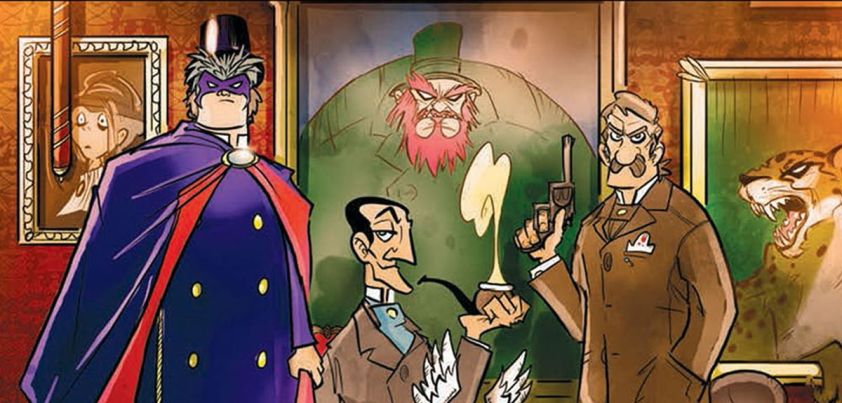 This is the first of Arthur Conan Doyle’s Sherlock Holmes short stories. The hereditary King of Bohemia hires Holmes to retrieve (steal!) photographic evidence of a scandalous affair. Uncharacteristically, the great detective underestimates the jilted woman and is unable to complete the assignment. Rather than displaying frustration or anger, Holmes is smitten… not with love, but with admiration for her intellect. Themes: philandering, class, sexism, deception, underestimating one’s foe, respect. Some say that Holmes’s esteem for Adler suggests a feminist theme. However, as Watson says, she is the woman; the only one he ever regards so highly. More…
This is the first of Arthur Conan Doyle’s Sherlock Holmes short stories. The hereditary King of Bohemia hires Holmes to retrieve (steal!) photographic evidence of a scandalous affair. Uncharacteristically, the great detective underestimates the jilted woman and is unable to complete the assignment. Rather than displaying frustration or anger, Holmes is smitten… not with love, but with admiration for her intellect. Themes: philandering, class, sexism, deception, underestimating one’s foe, respect. Some say that Holmes’s esteem for Adler suggests a feminist theme. However, as Watson says, she is the woman; the only one he ever regards so highly. More…
The Man from Mars
 In this story by Margaret Atwood a “big-boned”, athletic Canadian university student becomes anxious but gains self-esteem when a creepy-looking “Oriental” student begins to stalk her. The stalking, which largely takes place in plain sight, becomes a game of cat-and-mouse. Other men who have previously shown little interest in her take notice. Wondering what he sees in her, they begin to ask her out. She is not his only victim. When he is deported to his war-torn country, she becomes obsessed with trying to discover his fate. Themes include otherness (alienation and loneliness), beauty standards and self-image, stereotyping, obsession, fear. More…
In this story by Margaret Atwood a “big-boned”, athletic Canadian university student becomes anxious but gains self-esteem when a creepy-looking “Oriental” student begins to stalk her. The stalking, which largely takes place in plain sight, becomes a game of cat-and-mouse. Other men who have previously shown little interest in her take notice. Wondering what he sees in her, they begin to ask her out. She is not his only victim. When he is deported to his war-torn country, she becomes obsessed with trying to discover his fate. Themes include otherness (alienation and loneliness), beauty standards and self-image, stereotyping, obsession, fear. More…
The Minority Report
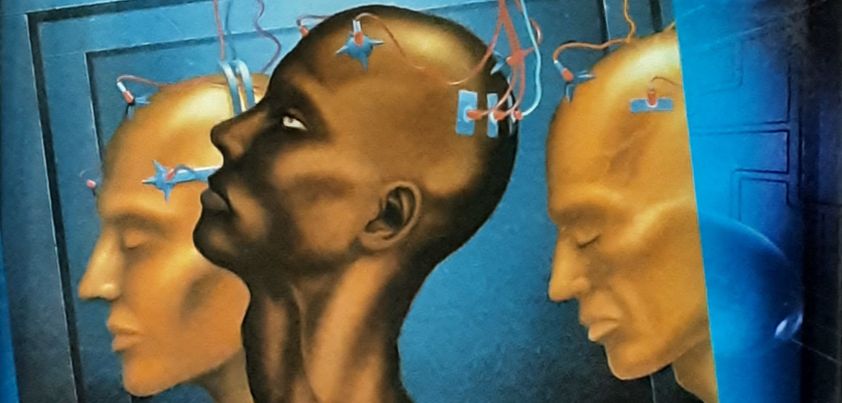 Philip Dick’s The Minority Report is a dystopian adventure story set in a society that takes policing a step even further than the infamous “Thought Police” in George Orwell’s Nineteen Eighty-Four. Its premise is that the authorities have found a way to identify a crime and imprison the would-be perpetrator before he or she even thinks of committing it. Their methods in doing this are disturbing to say the least. Themes: (general) free will vs. fate, injustice, trust vs. paranoia, self-fulfilling prophesy, extrajudicial murder; (for the “precogs”) violation of human rights, enslavement, degradation. More…
Philip Dick’s The Minority Report is a dystopian adventure story set in a society that takes policing a step even further than the infamous “Thought Police” in George Orwell’s Nineteen Eighty-Four. Its premise is that the authorities have found a way to identify a crime and imprison the would-be perpetrator before he or she even thinks of committing it. Their methods in doing this are disturbing to say the least. Themes: (general) free will vs. fate, injustice, trust vs. paranoia, self-fulfilling prophesy, extrajudicial murder; (for the “precogs”) violation of human rights, enslavement, degradation. More…